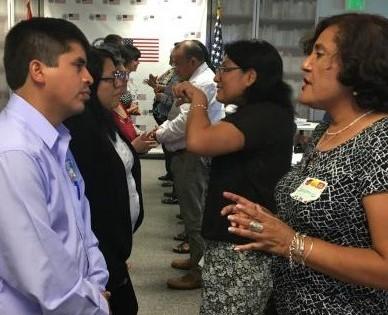Two English Language Fellows from the Western Hemisphere section teamed up to connect virtual training spaces and real-world workshops for maximum effect. Fellows Lisa Wakefield and Rob O’Leary knew that English language specialists and teacher leaders in Peru were being invited to take a virtual course titled “Shaping My Teaching,” which was sponsored by the Peruvian Ministry of Education. To support this online course, the English Language Fellows planned and conducted two days of face-to-face follow-up training for this group of sixteen leaders, bringing distance education together with in-person training time.
Wakefield gave a presentation on active learning strategies to improve student engagement in the classroom, along with a second presentation on creating workshops. These presentations provided the skills participants would need to work with teachers in their home regions, implementing what they had learned from the coursework and training. The culminating event was creating a workshop for participant to use with their fellow teachers when school begins in March.
O’Leary also presented two workshops, first focusing on classroom-management strategies and then moving on to one of his specialties, task-based learning. The TBL perspective will help teachers go beyond textbook exercises and modify those activities to be interactive. “From textbook to task-based lessons and from this to real life and challenging activities. The presentation showed us how to give the extra mile,” reported teacher Carmen Cama.
The sixteen participants came from nine regions around Peru, and they will have the chance to impact at least one hundred teachers each in their regions. Lida, one of the participating regional English specialist, said proudly, “I will do workshops in each province of my region.” Clever, a lead teacher in his district, agreed. “I will organize training for my colleagues all about interactive activities in classroom.”
With this event, O’Leary and Wakefield—and the dedicated local teachers they worked with—showed the power of collaboration. Regardless of the resources available or the money to be spent, it’s the cooperative spirit of people who really care about improving educational outcomes that matters most.


